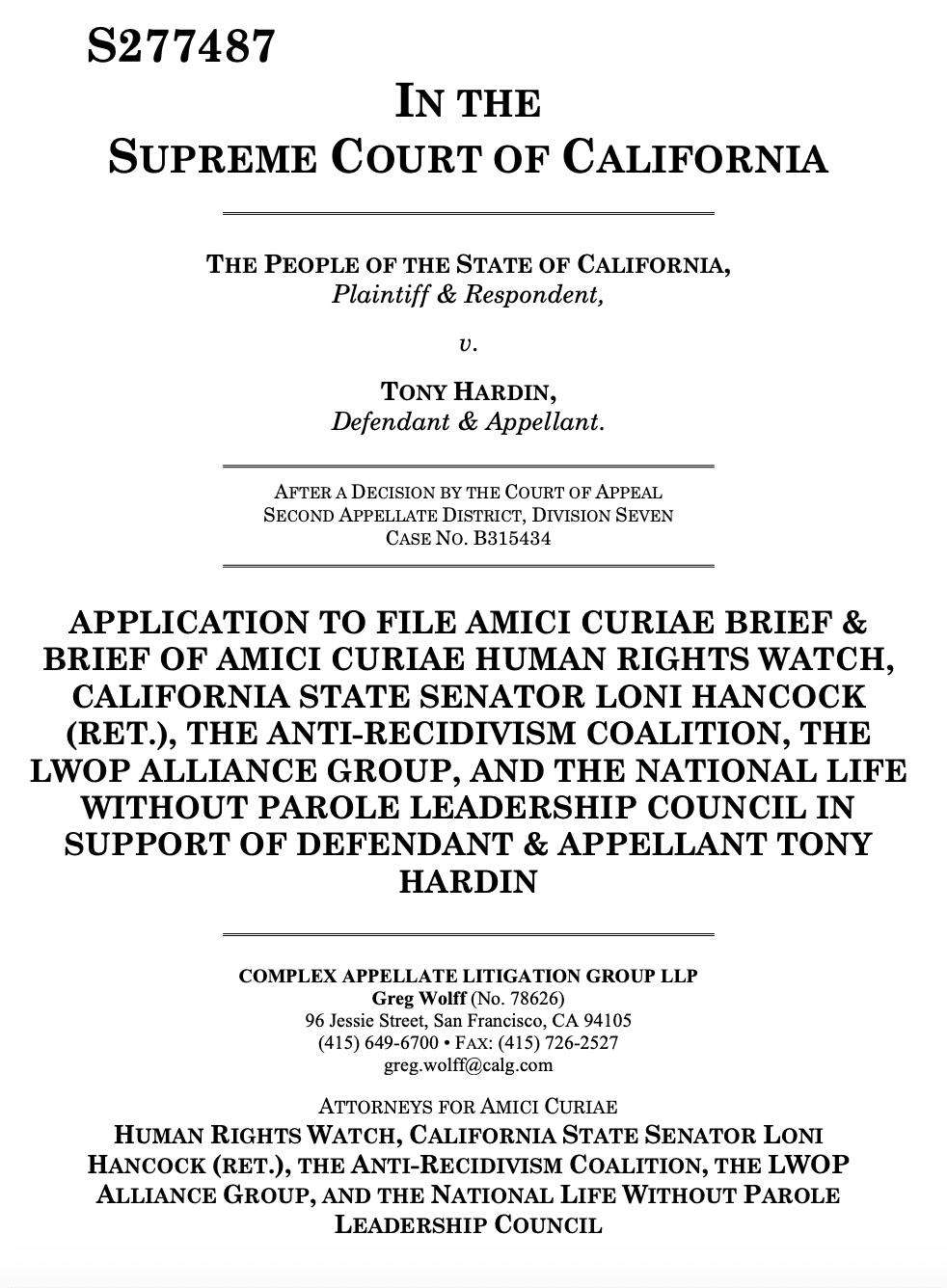
Summary of Argument
This court granted review to decide whether Penal Code section 3051 violates the equal protection clauses of the state and federal Constitutions by denying youth offender parole hearings to persons sentenced to life without the possibility of parole (LWOP) for crimes committed when they were 18 to 25 years of age. As Mr. Hardin demonstrated in his Answering Brief, there is no rational basis for excluding this group from California's parole process when youth offender parole hearings are guaranteed to others who committed similarly serious or violent crimes while the same age, some of whom received sentences "that could be the functional equivalent of a life without parole sentence." (People v. Hardin (2022) 84 Cal.App.5th 273, 278.)
As the court below recognized, section 3051 mandates youth parole hearings for persons who committed crimes when they were less than 26 years old because "the distinctive attributes of youth- transitory mental traits and environmental vulnerabilities--which ... mitigate culpability and offer the possibility of growth and change, apply equally to young adults up to age 25." (People v. Hardin, supra, 84 Cal.App.5th at pp. 278-279.) This is true regardless of the crime committed, the charges the district attorney chose to file, or the sentence imposed; it applies equally to persons sentenced to LWOP. As the high court recognized with regard to juveniles, none of these "distinctive (and transitory) mental traits and environmental vulnerabilities . . . is crime-specific.” (Miller v. Alabama (2012) 567 U.S. 460, 473.)
The circumstances of a crime committed by a youthful offender and the sentence imposed do not provide a rational basis for denying the offender an opportunity to show that after decades of incarceration they have changed and deserve a chance to re-enter society. Youth offenders sentenced to LWOP can be rehabilitated.
Young persons sentenced to LWOP will not necessarily pose a threat to public safety for their entire lives. The stories that appear below of youth offenders who were sentenced to LWOP but were released on parole are remarkable. Far from posing a danger to society, they have reformed themselves and are a benefit to society.
Excluding youth offenders from parole hearings also is not necessary to protect public safety because Penal Code section 3051 does not mandate that anyone be released from custody; it provides only an opportunity for people to appear before the Board of Parole Hearings and attempt to show that after decades in prison they are rehabilitated and their release on parole would not pose an unreasonable risk of danger to the public. Nobody is released through California’s discretionary parole process unless they can demonstrate they have insight into their past tragic decisions and have a solid plan to safely navigate a return to the community.
People like Mr. Hardin who were sentenced to LWOP for crimes committed when they were 25 years old or younger have the same capacity to be rehabilitated and transform their lives as other youthful offenders. There is empirical evidence that young people sentenced to LWOP can change and, if given the chance for parole, can safely be returned to society and prove to be a benefit to their communities.
Human Rights Watch interviewed 110 men and women who were freed following a sentence of LWOP. Some of their stories are detailed in the recent publication, “ ‘I Just Want to Give Back’ – The Reintegration of People Sentenced to Life Without Parole.” These accounts reveal that people who committed a crime described by a special circumstance before they turned 26 years old are often just as capable of rehabilitation as other 18 to 25-year-olds sentenced to parole- eligible life sentences. People change, especially young people, sometimes in astounding ways.
Many of these men and women have accomplished remarkable things since gaining their freedom. Nearly 80 percent were working at least 20 hours a week, 30 were taking college courses, 3 had earned an associate degree, 6 had completed a bachelor’s degree, several earned master’s degrees, and one has started a PhD program. What’s more, nearly all had embraced public service. Ninety-four percent had volunteered with charities, community groups, or nonprofit organizations following their release, some rising to leadership roles.
All of these people had been subjected to California’s discretionary parole gauntlet, which is designed to test a parole candidate’s growth and rehabilitation. The criteria for evaluating parole candidates are well-developed and include considering the facts of the crime and receiving input from the victim(s) of the crime.
The personal stories that appear below demonstrate what the California Legislature realized in creating youth offender parole; the character and minds of young people are not fixed; they are malleable and immature and uniquely capable of change. This is true regardless of the circumstances of the crime or the sentence imposed. Even young people who have committed the most heinous of crimes are capable of extraordinary transformations.
In enacting section 3051, the Legislature chose to focus on rehabilitative transformation—not the crime. As a result, there is no rational basis for denying individuals who were sentenced to LWOP for crimes they committed when they were 18 to 25 years of age the opportunity to demonstrate that, after decades of incarceration, they have earned the right to be considered for release on parole.